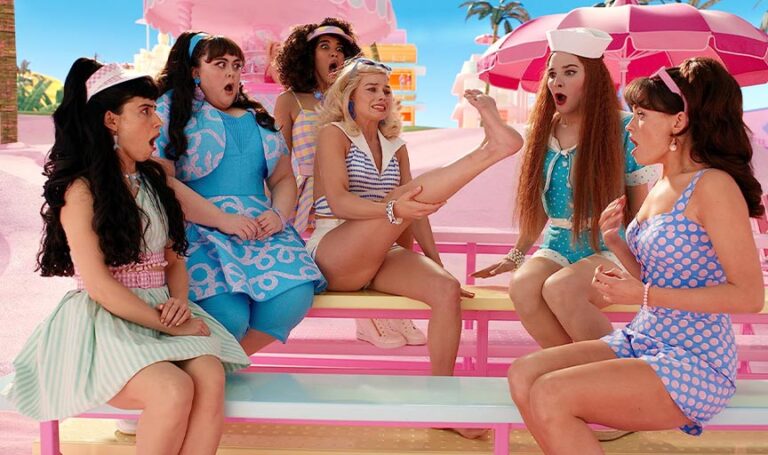Netizens are mad about Greta Gerwig’s Barbie gaining 9 Golden Globe nominations

Greta Gerwig’s film Barbie has managed to score an impressive nine nominations at the 81st Golden Globe Awards, securing its position as the highest-grossing film of 2023. Directed by real-life Barbie Greta Gerwig and starring Margot Robbie, the movie has etched itself into history by helping make Gerwig the first woman to hold sole directing credit on a billion-dollar film. Yes, Barbie.
At the Golden Globes, Barbie was nominated in four major categories, Best Picture (Comedy or Musical), Best Screenplay, Best Director, and Best Leading Actress for Robbie. With three entries in the Original Song category, the film now stands as the second most-nominated in Golden Globes history, tying with the 1972 film Cabaret and trailing only behind Nashville, which received 11 nominations.
In addition to individual accolades, Barbie is also a nominee for a new award recognising blockbuster films, alongside notable contenders like Oppenheimer, which currently has 8 nominations.
@whomagazine It really is the year of Barbie!!! The film has picked up nine nominations for the 2024 Golden Globe Awards - making it the second most-nominated film ever at the Golden Globes 💗💗💗 #goldenglobes #goldenglobesnominations #barbie #barbiemovie #margotrobbie #ryangosling #gretagerwig #dualipa #billieeilish #finneas #markronson #barbiemovies #margotrobbiebarbie #kenough
♬ suono originale - Dennis_Coghene
However, the announcement of this year’s Golden Globe nominees wasn’t universally embraced. As you may recall, the film faced criticism from certain demographics, particularly in far-right circles, where some argued against the diverse representation of races, sizes, and abilities among the Barbies, especially the portrayal of a Black woman as President Barbie, played by Issa Rae. The film’s narrative, going beyond the realm of a typical doll movie, delves into several feminist themes exploring empowerment and injustice.
Barbie got more nominations than Oppenheimer ?? pic.twitter.com/0NN3RkJmhJ
— Popcorn Picks (@popcornpickss) December 11, 2023
Social media also had their say on the nominations, with some users—most likely women-hating losers—expressing legitimate concerns about the state of the country. One X netizen wrote: “When Barbie leads Golden Globes nominations, you know this country is in serious decline.”
When Barbie leads Golden Globes nominations you know this country is in serious decline.
— SandraSays (@Sandra26865205) December 12, 2023
Barbie. Golden Globes nominations. Hilarious
— Carl Toersbijns (@CToersbijns) December 12, 2023
Others continued to question the film’s recognition, adding with comments like, “The Golden Globes are a bit of a precursor to the Oscars, and there’s Oscar buzz for Barbie. Am I missing something?”
"Oppenheimer" and "Barbie" lead Golden Globe nominations. The Golden Globes are a bit of a precursor to the Oscars and there's Oscar buzz for "Barbie". . . Am I missing something?
— ~KJC~ (@BojonBaby) December 11, 2023
I haven't seen it, but is it THAT good? Anyone?
Fortunately, this year’s Golden Globe nominations not only acknowledge the film’s artistic merits but also emphasise its role in sparking discussions about representation, equality, and societal expectations.
Recently, there’s been a significant transformation in the awards landscape. The Golden Globe Awards, historically a major player in the industry, has faced major criticism and undergone substantial changes in recent years. The Hollywood Foreign Press Association (HFPA), the organisation behind the Globes, grappled with controversies, including sexual assault scandals, boycotts, and ethical lapses, prompting a comprehensive restructuring.
Following this, HFPA was dissolved, and the awards’ assets, formerly linked to a charitable entity, shifted to a for-profit venture under Dick Clark Productions. The revamped awards ceremony now features an expanded membership, including individuals from minority backgrounds, signalling a commitment to heightened accountability.





